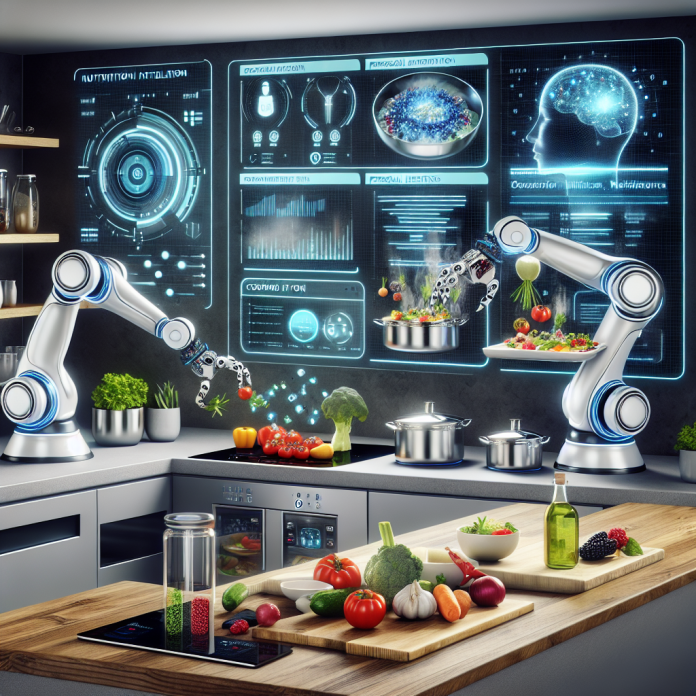Artificial Intelligence (AI) has become a game-changer in the food industry, revolutionizing the way we produce, distribute, and consume food. From sophisticated algorithms that optimize crop yields to robotic chefs serving up perfectly cooked dishes, AI is transforming every aspect of the food ecosystem.
### **AI in Agriculture**
At the heart of the food industry lies agriculture, where AI is making significant strides in improving efficiency and sustainability. One example is the use of drones equipped with AI-powered cameras to monitor crop health and detect diseases early on. By analyzing large volumes of data, these drones can pinpoint areas that require attention, allowing farmers to take targeted action and maximize yields.
### **Precision Farming**
Another area where AI is making a mark is precision farming. By integrating data from sensors, satellites, and weather forecasts, AI algorithms can optimize irrigation, fertilization, and pest control, leading to higher productivity and reduced environmental impact. This data-driven approach is transforming traditional farming practices and enabling farmers to make informed decisions in real-time.
### **Food Production and Processing**
In food production and processing, AI is streamlining operations and enhancing product quality. For instance, AI-powered robots can efficiently sort and package fruits and vegetables, ensuring consistency and reducing waste. In addition, AI algorithms can analyze food samples to detect contaminants or spoilage, helping to maintain food safety standards and prevent outbreaks of foodborne illnesses.
### **Personalized Nutrition**
On the consumer side, AI is driving a shift towards personalized nutrition. By analyzing an individual’s genetic makeup, lifestyle, and dietary preferences, AI algorithms can recommend personalized meal plans tailored to meet specific nutritional needs or health goals. This level of customization is reshaping the food industry, as companies strive to offer products and services that cater to the unique needs of each consumer.
### **Food Delivery and Service**
The rise of food delivery services has been fueled by AI-powered algorithms that optimize delivery routes, predict demand, and personalize recommendations. These platforms leverage AI to match customers with restaurants based on their preferences, track delivery times in real-time, and provide feedback mechanisms for continuous improvement. As a result, food delivery has become more convenient, efficient, and customer-centric, thanks to AI technology.
### **Challenges and Ethical Considerations**
Despite the numerous benefits of AI in the food industry, there are also challenges and ethical considerations that need to be addressed. One concern is the potential job displacement caused by automation, as AI-powered robots and machines replace human workers in food production and processing. Another issue is data privacy and security, as AI algorithms rely on vast amounts of personal data to make informed decisions, raising questions about who has access to this information and how it is being used.
### **Future Outlook**
Looking ahead, the influence of AI on the food industry is only expected to grow. As technology continues to advance, we can expect to see more sophisticated applications of AI in areas such as food safety, sustainability, and personalized nutrition. Companies that embrace AI and invest in digital transformation are likely to gain a competitive edge in the increasingly complex and demanding food marketplace.
### **Real-Life Examples**
One real-life example of AI’s impact on the food industry is the collaboration between IBM and Mars Inc. to develop a blockchain-based platform for tracking food supply chains. By using AI algorithms to analyze data from sensors and IoT devices, this platform enables real-time monitoring of food products from farm to fork, enhancing traceability and transparency.
Another example is the use of AI-powered chatbots by fast-food chains like Domino’s and Pizza Hut to streamline the ordering process and provide personalized recommendations to customers. These chatbots leverage natural language processing and machine learning to understand customer preferences and deliver an enhanced user experience.
### **Conclusion**
In conclusion, AI’s influence on the food industry is profound and far-reaching, touching every aspect of the food ecosystem from farm to table. By harnessing the power of AI, companies can drive innovation, improve efficiency, and deliver personalized experiences to consumers. However, as AI technology continues to evolve, it is essential to address challenges and ethical considerations to ensure a sustainable and equitable future for the food industry. Ultimately, AI has the potential to transform the way we produce, distribute, and consume food, shaping a more efficient, sustainable, and personalized food system for generations to come.

